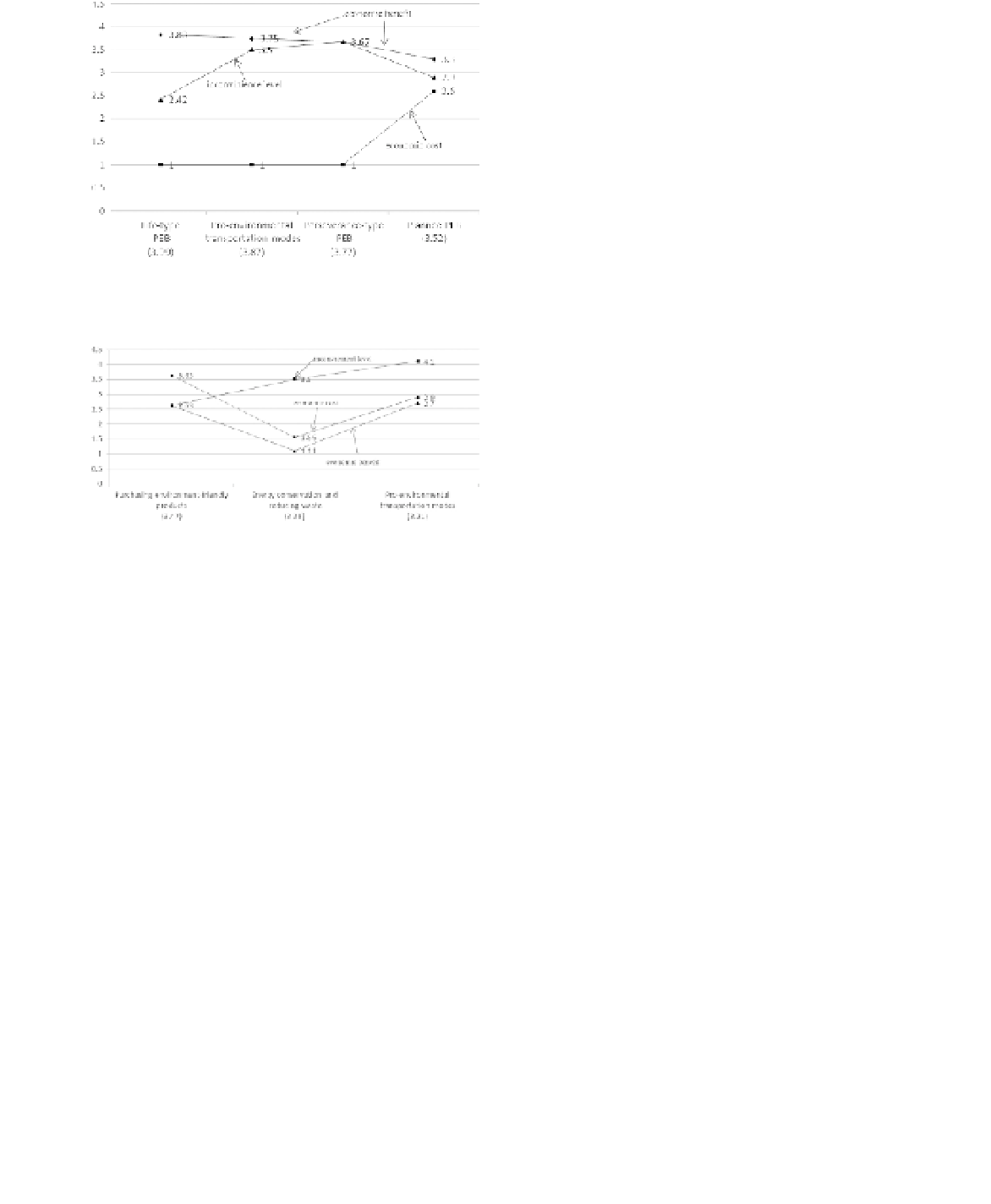Travel Reference
In-Depth Information
behaviors actually manifest rather than putting in
efforts to modify the attitude, knowledge and value
of tourists could be a more effective method.
As the results of this study, the most effective
method must be to reduce the inconvenience expe-
rienced by behaving environmentally in the tourist
destinations. This implies the need to apply envi-
ronmental designs within the tourist destinations.
Environmental designs are those that can reduce
the stress and inconveniences of practicing envi-
ronment-friendly behaviors and can be applied
through the methods of adopting new facilities
or devices. This had been proven in the preceding
researches that reported reduction in the behavior
of indiscriminant throwing out of waste by fur-
nishing waste cans with more beautiful design and
by placing them in more convenient locations (Gel-
ler, Brasted & Mann, 1979).
In addition, Consequence strategies could be
an effective means of inducing PEB. It was found
that people behave environmentally under daily life
circumstances because of the low cost with high
benefits. Therefore, including strategies such as
discounts and coupons at the tourist destinations
could be a means of increasing the benefits of PEB
in order to promote such behaviors. Future studies
in tourism area need to further expand the exami-
nation of PEB from the perspective of cost-benefits
by transcending the domain of existing researches
conducted from the perspective of ethics.
Figure 1.
The cost-benefit of PEB in daily life.
Figure 2.
The cost-benefit of PEB in Tourism.
for each of the items of cost-benefits. There was a
trend of lower performance of pro-environmental
behavior with greater 'inconvenience level' under
tourism circumstance. The economic cost and ben-
efits displayed tendency that is not in concordance
with the extent of the pro-environmental behavior.
REFERENCES
Ajzen, I. & Fishbein, M. (1980).
Understanding attitudes
and predicting social behaviour
. Englewood Cliffs, NJ:
Prentice Hall.
Barr, S., Shaw, G., Coles, T. & Prillwitz, J. (2010). A holi-
day is a holiday: Practicing sustainability, home and
away.
Journal of Transport Geography, 18
(3), 474-481.
Diekmann, A. & Preisendörfer, P. (2003). Green and
Greenback The Behavioral Effects of Environmen-
tal Attitudes in Low-Cost and High-Cost Situations.
Rationality and Society, 15
(4), 441-472.
Dunlap, R.E. & Scarce, R. (1991). Poll trends: Environ-
mental problems and protection.
Public Opinion Quar-
terly, 55
(4), 651.
Geller, E.S., Brasted, W.S. & Mann, M.F. (1979). Waste
receptacle designs as interventions for litter control.
Journal of Environmental Systems, 9
(2), 145-160.
Han, H., Hsu, L.-T.J. & Sheu, C. (2010). Application of
the Theory of Planned Behavior to green hotel choice:
Testing the effect of environmental friendly activities.
Tourism management, 31
(3), 325-334.
Hares, A., Dickinson, J. & Wilkes, K. (2010). Climate
change and the air travel decisions of UK tourists.
Journal of Transport Geography, 18
(3), 466-473.
McKercher, B. & Prideaux, B. (2011). Are tourism
impacts low on personal environmental agendas?
Journal of Sustainable Tourism, 19
(3), 325-345.
5 CONCLUSION
This study provides empirical evidence that people
behave less environmentally in tourism circum-
stance than daily life. While majority of researches
focused on variables such as the environmental
attitude, value and knowledge, the present study
attempt to explain the reason for lack of practicing
pro-environmental behaviors under the tourism
context by applying the perspective of cost-bene-
fits. Results suggest that people value different cost
and benefit criteria according to their situation.
This study offers the following implications to
the marketers and managers in tourism industry.
According to the result of the current study, all
the pro-environmental behaviors under the tour-
ism circumstance incur higher cost but offer lower
benefits in comparison to those under the daily life
circumstance. Therefore, modifying the context of
the circumstances in which the pro-environmental




Search WWH ::

Custom Search